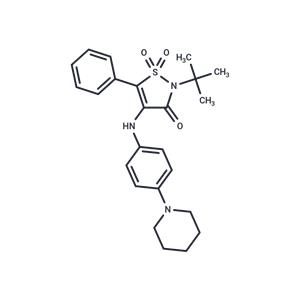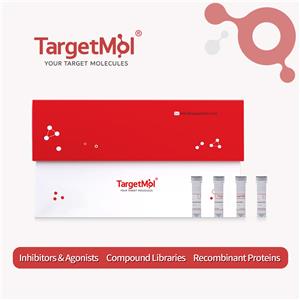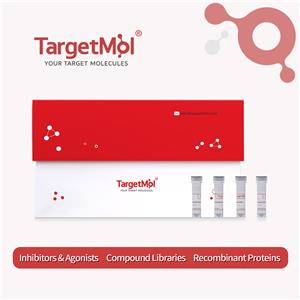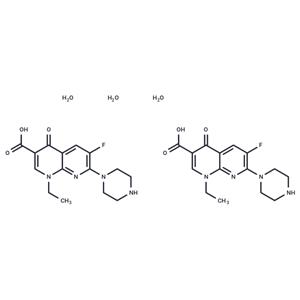
AZ876 NEW
| Price | $45 | $82 | $126 |
| Package | 1mg | 5mg | 10mg |
| Min. Order: | |
| Supply Ability: | 10g |
| Update Time: | 2024-11-19 |
Product Details
| Product Name: AZ876 | CAS No.: 898800-26-5 |
| Purity: 99.41% | Supply Ability: 10g |
| Release date: 2024/11/19 |
Product Introduction
Bioactivity
| Name | AZ876 |
| Description | AZ876 is a potent, highly selective LXR agonist with Ki/EC50 of 7/6 nM and 11/73 nM for hLXRα and hLXRβ respectively. |
| Kinase Assay | Binding vectors for His-tagged protein production were prepared by inserting the ligand-binding domain cDNA of human LXRα (amino acids 205–447) in pET28 and the ligand-binding domain cDNA of LXRβ (amino acids 216–461) in pET24D. Proteins were expressed in Escherichia coli and purified on Ni+ columns. Binding assays using LXRα and LXRβ protein were run by adding reagents to Wallac Isoplate 1450–514. Briefly, each 96 plate well contained assay buffer (20 mM Tris pH 7.5, 80 mM NaCl, 2 mM dithiothreitol, 0.125% Chaps and 10% glycerol), 0.1 mg SPA beads (polylysine-coated yttrium silicate beads), LXRα (0.5 μg) or LXRβ (0.25 μg), 30 nM 3H-ligand (specific activity of 473 Kbq/nmol) and test compound in a 10-point dose-response dilution. The assay mixture was shaken gently for 2 h on a plate shaker after which the beads were allowed to settle for 1 hour before counting. Transactivation vectors were prepared by inserting the ligand-binding domain cDNA sequences of human or mouse LXRα and LXRβ in frame with the yeast Gal4 transcription factor DNA binding domain and the nuclear localization signal from the T-antigen of polyomavirus in the eucaryotic expression vector pSG5. The ligand-binding domain cDNA of human LXRα and LXRβ was the same as mentioned previously. The mouse sequence corresponded to amino acids 203–445 for LXRα and amino acids 201–446 for LXRβ. The vectors were co-transfected with a pGL3 luciferase reporter plasmid containing a minimal SV40 promoter and five copies of the UAS Gal4 recognition site into U2/OS osteosarcoma cells. Ligands were added as 10-point dose-response curves and then luciferase activity was measured after 48 h [1]. |
| Animal Research | Cardiac hypertrophy was induced in male C57Bl6/J mice via transverse aortic constriction (TAC) for 6 weeks. During this period, sham and TAC-operated mice were randomized to receive either regular chow (control) or chow supplemented with AZ876 (20 μmol/kg/day). Cardiac function was assessed with echocardiography and invasive haemodynamics. In vitro studies were performed in isolated neonatal rat ventricular myocytes (NRVMs) and adult rat cardiac fibroblasts. Leucine and proline tracer assays were used to measure protein and collagen synthesis, respectively [2]. |
| In vitro | AZ876 suppressed up-regulation of hypertrophy- and fibrosis-related genes and further inhibited prohypertrophic and profibrotic TGFβ-Smad2/3 signaling. In cardiomyocytes, phenylephrine-stimulated cellular hypertrophy was significantly decreased in AZ876-treated cells. In cardiac fibroblasts, AZ876 prevented TGFβ- and angiotensin II-induced fibroblast collagen synthesis, and inhibited up-regulation of the myofibroblastic marker, α-smooth muscle actin [2]. |
| In vivo | Low-dose AZ876 had no effect on plasma or liver lipids, whereas high-dose AZ876 increased plasma triglycerides and reduced cholesterol compared with controls. Low-dose AZ876 reduced lesion area; and high-dose AZ876 strongly decreased lesion area, lesion number, and severity. In either dose, AZ876 did not affect lesion composition [1]. Cardiac hypertrophy was induced in C57Bl6/J mice via transverse aortic constriction (TAC) for 6 weeks. During this period, mice received chow supplemented or not with AZ876 (20?μmol/kg/day). In murine hearts, LXRα protein expression was up-regulated ~7-fold in response to TAC. LXR activation with AZ876 attenuated this increase, and significantly reduced TAC-induced increases in heart weight, myocardial fibrosis, and cardiac dysfunction without affecting blood pressure [2]. |
| Storage | Powder: -20°C for 3 years | In solvent: -80°C for 1 year | Shipping with blue ice. |
| Solubility Information | DMSO : 55 mg/mL (125.12 mM) 5% DMSO+40% PEG300+5% Tween 80+50% Saline : 2.5 mg/mL (5.69 mM), Please add co-solvents sequentially, clarifying the solution as much as possible before adding the next one. Dissolve by heating and/or sonication if necessary. Working solution is recommended to be prepared and used immediately. |
| Keywords | AZ-876 | Liver X receptor | LXR | AZ 876 | Inhibitor | AZ876 | inhibit |
| Inhibitors Related | SR9243 | GW6340 | T0901317 | GSK3987 | RGX-104 | SR9238 | GSK2033 | BE1218 | (20S)-Protopanaxatriol | GW3965 hydrochloride | LXR-623 | Rovazolac |
| Related Compound Libraries | Nuclear Receptor Compound Library | Target-Focused Phenotypic Screening Library | Bioactive Compound Library | Metabolism Compound Library | Lipid Metabolism Compound Library | Bioactive Compounds Library Max | Covalent Inhibitor Library | Anti-Metabolism Disease Compound Library |
Company Profile Introduction
Target Molecule Corp. (TargetMol) is a global high-tech enterprise, headquartered in Boston, MA, specializing in chemical and biological research product and service to meet the research needs of global customers.
TargetMol has evolved into one of the biggest global compound library and small molecule suppliers and a customer based on 40+ countries. TargetMol offers over 80 types of compound libraries and a wide range of high-quality research chemicals including inhibitors, activator, natural compounds, peptides, inhibitory antibodies, and novel life-science kits, for laboratory and scientific use. Besides, virtual screening service is also available for customers who would like to conduct the computer-aided drug discovery.
You may like
Recommended supplier
| Product name | Price | Suppliers | Update time | |
|---|---|---|---|---|
| $1.00/1KG |
VIP6Y
|
Career Henan Chemical Co
|
2020-01-01 |
- Since: 2011-01-07
- Address: 36?Washington?Street, Wellesley?Hills
INQUIRY







 United States
United States